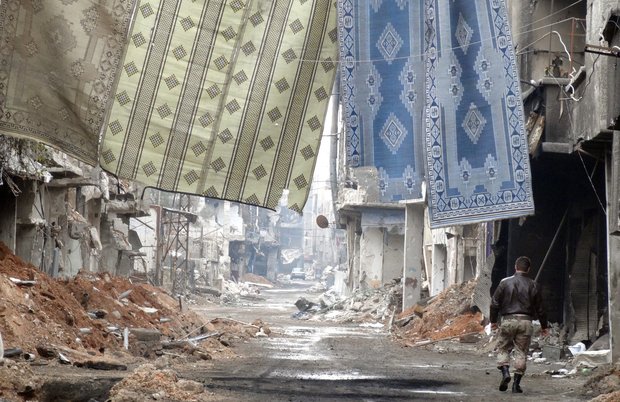PHOTO: The Tadamon district of Damascus (Jonathan Landay/McClatchy)
Jonathan Landay reports for McClatchy on the contrast between prosperity and destruction in Syria’s capital:
Several miles south of the glitzy downtown boutiques and upscale eateries that serve the Damascus elite, regime troops besieging rebel-held suburbs keep watch from sandbagged balconies and holes in walls over a rubble-choked no-man’s land of ruined streets and bombed-out buildings.
Whiffs of sewage and smoke tinge the wintry air. The ground is a carpet of shell casings, glass shards and concrete chunks. Water-filled trenches show where regime bulldozers have dug for rebel tunnels. In an abandoned apartment, four old television sets glow in the gloom. Rigged to cameras aimed at rebel lines, the crude surveillance system helps limit exposure to snipers.
“Yesterday, I saw three rebels running from the right side,” recounted Abu Ali, 47, who mans the post and used an alias, as did other regime militiamen who spoke to a reporter visiting the embattled suburb of Tadamon. “I saw a man carrying a board, and we sniped him. A guy ran to rescue him, and we sniped him. And then we sniped the guy who tried to rescue the rescuer with a rope.”
A 15-minute drive away, through a labyrinth of checkpoints, life in President Bashar Assad’s citadel offers a stunning contrast. Shops are stacked with goods, regular garbage collections and street sweepers keep the downtown free of refuse and traffic backs up at numerous checkpoints, suggesting that gasoline is now plentiful after several periods of intermittent supplies.
The security belt that separates Tadamon and other battle-weary areas from central Damascus contributes to a veneer of normalcy in the city. That relative calm reassures Assad’s loyalists, who point to a recent slackening in car bombings and shelling as evidence that government offensives have succeeded in pushing rebels back in some suburbs.
“As long as Bashar Assad is in power, we don’t mind” the war, declared Fahed Nizam, 42, whose family has hawked roasted nuts from a small shop in Damascus’ fabled old city for 40 years, the same period in which the Assad family has ruled Syria. “Bashar is our eyes. He keeps us safe.”
Many people, however, agree that beneath the veneer are serious problems that will worsen with no apparent progress in diplomatic efforts to mediate an end to the carnage. The relative calm of the capital’s center belies the savagery that’s laid waste to large parts of the suburbs, and huge swaths of cities and towns in other parts of Syria. Peace talks, brokered by the United States and Russia, next week in Switzerland are unlikely to resolve anything anytime soon.
“You know the novels of Franz Kafka?” asked Mokhtar Lamani, who heads the Damascus office of U.N. Special Envoy Lakhdar Brahimi, referring to the German writer famed for his surreal, nightmarish stories. “It’s like living in one of his books.”
Armed soldiers and plainclothes security men are everywhere. While the daytime is mostly free of the sounds of war, the nights often resound with explosions and gunfire from the fighting on the capital’s periphery.
The checkpoint-spawned traffic jams, far-off nighttime explosions and sporadic power cuts are among the few outward signs in Damascus of the war that’s claimed tens of thousands of lives since Assad’s forces fired on peaceful protests in March 2011. Some 7 million others have been uprooted, thousands of foreign Islamists have poured into Syria and the sectarian strife has bled into Iraq and Lebanon.
Residents complain about the high costs of fuel and food – estimates put inflation at anywhere from 40 percent to nearly 200 percent – and serious crimes, especially kidnappings, are said to be soaring in a city where it was once safe to walk late into the night.
In many rebel-held neighborhoods on the capital’s outskirts, the regime has imposed blockades, preventing the transport of food and water and leaving thousands of women and children hungry. In some, the tactic has been successful, forcing insurgents to negotiate truces in return for aid and evacuations.
In others, civilians with little to eat or drink are still trapped – or prevented by rebels from leaving. They shelter in shell-pitted buildings from icy rains and duels between the rebels and locally recruited regime militias, whose formations have allowed Assad’s manpower-short army to shift troops to other battlefronts.
“Every day, the rebels try to push forward because they can enter Damascus from here. So we are trying to stop them,” explained Abu Aksam, 45, a veteran army officer who supervises the militia in Tadamon. On a recent day, he was accompanied by his 5-year-old son, who wore a child-size camouflage uniform.

